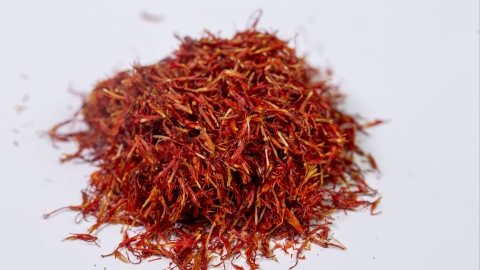What should saffron not be consumed with?
Generally speaking, saffron should not be consumed together with crabs, hawthorn, strong tea, alcoholic beverages, garlic, or other similar foods. It should also not be taken with medications such as warfarin sodium tablets, aspirin enteric-coated tablets, clopidogrel bisulfate tablets, heparin sodium injection, or dipyridamole tablets. The specific explanations are as follows:
I. Foods
1. Crabs
Crabs are cold in nature, and saffron is slightly cold as well. Consuming them together may intensify internal coldness, potentially irritating the gastrointestinal mucosa and causing discomfort such as abdominal pain and diarrhea. This is particularly true for individuals with cold deficiency of the spleen and stomach, who may experience more pronounced symptoms. Therefore, it is not recommended to consume them together.

2. Hawthorn
Hawthorn has blood-activating and stasis-resolving effects, and saffron similarly possesses strong blood-activating properties. Consuming them together may enhance the blood-activating effect, potentially increasing the risk of bleeding, such as gingival bleeding or skin bruising. Individuals with a tendency to bleed should especially avoid this combination.
3. Strong Tea
Strong tea contains large amounts of tannic acid, which may combine with active components in saffron to form substances that are difficult for the body to absorb. This reduces the bioavailability of saffron's effective components and diminishes its intended effects. Therefore, they should not be consumed together.
4. Alcoholic Beverages
Alcohol can irritate the gastrointestinal tract and may affect liver metabolic function. Saffron is metabolized through the liver, so consuming alcohol together with saffron may increase the liver’s burden and potentially cause gastrointestinal discomfort such as nausea and vomiting. Additionally, alcohol might interfere with the effects of saffron components, so this combination should be avoided.
5. Garlic
Garlic is a spicy and irritating food that can stimulate the gastrointestinal mucosa. Saffron may also exert some irritation on the gastrointestinal tract. Consuming both together may intensify this irritation, easily causing discomfort such as a burning sensation in the stomach or abdominal pain. Therefore, it is not recommended to consume them together.
II. Medications
1. Warfarin Sodium Tablets
This is an anticoagulant medication that works by inhibiting the synthesis of vitamin K-dependent coagulation factors. Saffron has blood-activating effects, and combining the two may enhance anticoagulant effects, possibly leading to abnormal coagulation function and an increased risk of bleeding, such as nosebleeds or internal bleeding.
2. Aspirin Enteric-Coated Tablets
This medication inhibits platelet aggregation and has an anti-thrombotic effect. Combining it with saffron may result in a cumulative inhibitory effect on platelet aggregation, increasing the risk of bleeding, such as skin bruising or prolonged wound bleeding. This combination must be strictly avoided.
3. Clopidogrel Bisulfate Tablets
This is a platelet aggregation inhibitor that prevents platelets from adhering and aggregating. The blood-activating effect of saffron may further impair coagulation function. Combining the two may increase the risk of bleeding, which is detrimental to health. Therefore, they should not be used together.
4. Heparin Sodium Injection
This is a fast-acting anticoagulant drug used for the prevention and treatment of thrombosis. Combining it with saffron, which also has blood-activating properties, may enhance the anticoagulant effect and potentially cause severe bleeding, such as cerebral hemorrhage or gastrointestinal bleeding. Their combined use must be strictly prohibited.
5. Dipyridamole Tablets
This medication inhibits platelet aggregation and is used to prevent thrombosis. Combining it with saffron may enhance the anti-platelet aggregation effect, increasing the likelihood of bleeding, such as gingival bleeding or subcutaneous bleeding. Therefore, they should not be consumed together.
Before consuming saffron in daily life, it is important to confirm whether you are taking any of the above medications or eating related foods. You should consult a healthcare professional before using saffron to avoid adverse interactions. If you accidentally consume these together and experience discomfort, seek medical attention promptly.







